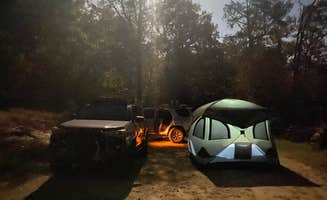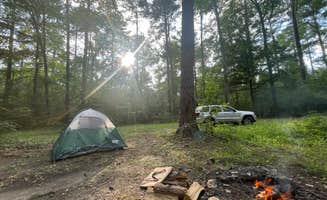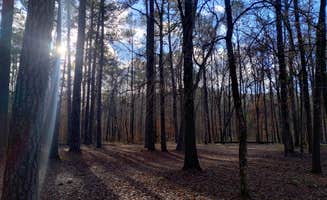Dispersed camping near Milledgeville, Georgia offers primitive outdoor experiences on public lands within the Piedmont region, characterized by rolling hills and mixed hardwood forests. Winter temperatures typically range from 30-70°F, with summer highs regularly exceeding 90°F. These camping areas require self-sufficiency as they lack developed facilities and often feature clay or dirt access roads that become challenging after rainfall.
What to do
Hiking nearby trails: At Ocmulgee River Camp, visitors can access horse trails that double as hiking paths. "Spot with a nice horse trail to hike - saw some deer and a mystery black animal, maybe a boar or a bear - unsure," reports one December camper.
Wildlife observation: Early mornings provide optimal wildlife viewing opportunities. One visitor to Ocmulgee River Camp noted, "Open spaces and very quiet this time of the year (January) train horn in the distance and gunshots in the distance as well from hunters here and there but all around a great spot to really enjoy."
Water exploration: The natural cascades at Murder Creek Parking Area are accessible via a short 200-foot walk from the parking area. During summer months, local swimming holes become popular destinations. "Had fun walking down to the water. I suspect in the summer this area is quite the hot spot with swimmers," notes one visitor.
What campers like
Dark night skies: Tyler Hunt Camp offers exceptional stargazing opportunities due to minimal light pollution. A camper mentions the area is "super dark at night and beautiful," making it ideal for astronomy enthusiasts or those seeking to disconnect from urban environments.
Seasonal temperature variation: Winter camping remains comfortable in this region. At Ocmulgee River Camp, a visitor during December noted, "Very nice a bit bumpy on the drive in but no major holes. Quiet and peaceful 2 neighbors great amount of space to find a nice spot."
Open camping spaces: Many dispersed sites feature cleared areas suitable for multiple tents or small groups. As one camper at Ocmulgee River Camp described, "Beautiful campsite, just a few neighbors, tons of flat space and a few fire pits."
What you should know
Hunting activity: Several dispersed camping areas overlap with hunting lands. At Ocmulgee River Camp, campers should expect to "hear gunshots in the distance as well from hunters here and there" during hunting seasons.
Vehicle traffic patterns: Some sites experience unexpected nighttime traffic. At Tyler Hunt Camp, one camper reported: "As night fell, I began preparing for bed, but I noticed vehicles coming and going—at least three within an hour. Around 10 PM, a few Mustangs pulled up and sat for about 45 minutes."
Permit requirements: Rum Creek WMA and similar Wildlife Management Areas require proper documentation. "Must have a hunting or fishing license or a land use pass," confirms one visitor to Rum Creek WMA.
Access road conditions: Most sites require driving on unpaved roads with varying conditions. For Ocmulgee River Camp, one camper describes the access as "only a mile off the road, which is a little bumpy but manageable."
Tips for camping with families
Pack insect protection: Bug activity increases near water sources and during humid periods. At Ocmulgee River Camp, one summer visitor noted it was "quite hot but surprisingly not that buggy," suggesting insect levels vary by season and specific location.
Plan for noise management: Train horns and hunting sounds occur at some sites. A January visitor to Ocmulgee River Camp mentioned hearing "train horn in the distance and gunshots in the distance as well from hunters."
Consider weekday visits: Weekend traffic increases at popular dispersed sites. Hillsboro Road Wildlife Area and other less-known locations may provide more solitude during peak periods.
Bring entertainment: These areas lack developed recreation facilities, so families should pack their own activities. Card games, field guides for plant identification, or simple sports equipment helps keep children engaged.
Tips from RVers
Size limitations: Larger rigs face challenges on narrow, unpaved access roads. Smaller trailers and camper vans prove more suitable for these primitive sites.
Level spot selection: These natural areas lack graded campsites. Upon arrival, scout for naturally level ground before setting up. Bring leveling blocks as backup.
Water conservation: With no hookups available, RVers must carry all water needed. A typical conservation strategy involves using disposable plates and limiting dishwashing to essential items only.
Waste management planning: Pack out all trash and prepare for managing holding tanks without dump stations. Some campers recommend portable waste tanks for longer stays at Concord Hunt Camp and similar primitive areas.




